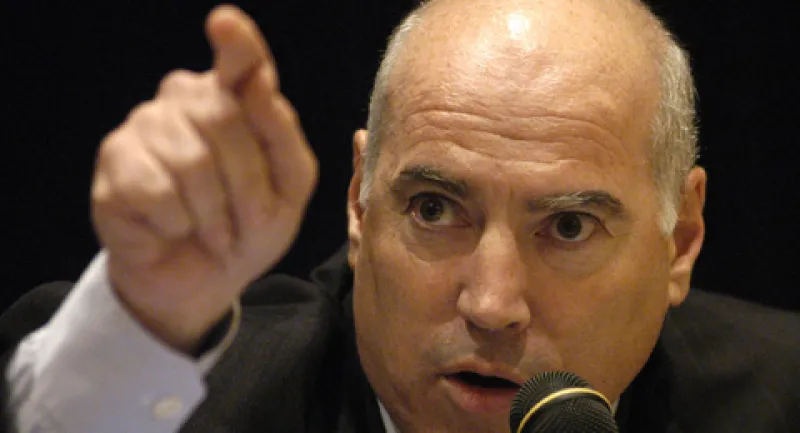Here is yet another reminder why small, individual investors should not be spending their time and savings on buying individual stocks. The savvy pros always manage to find some sort of advantage.
Case in point: California-based activist investor Relational Investors, co-founded by Ralph Whitworth and David Batchelder, has identified its newest target — Dallas-based Flowserve Corp.
The activist investment firm earlier this week filed a 13D disclosing it owned more than 3 million shares, or 5.65 percent, of Flowserve’s total shares outstanding. It also simultaneously filed a delayed 13F disclosing it owned more than 238,000 shares at the end of the first quarter. Flowserve, which has a $6 billion market capitalization, makes industrial pumps, valves and other equipment for the chemical, oil and gas and power industries.
Keep in mind that the deadline for the March 2012 13F was around May 15. So, it took about a 40-day extension. Investors can obtain an extension for the filing if they feel it could be hurt by the disclosure. Under SEC rules, investors can seek "confidential treatment" in certain limited circumstances for an ongoing investment strategy, including an ongoing program of acquisition or disposition. “It is not unusual for us to request confidential treatment while in an accumulation program,” Whitworth said in a phone interview.
So, thanks to this provision, the $6 billion Relational wound up accumulating most of its Flowserve position since the end of the first quarter, but chose not to disclose its earlier, much smaller position until it passed the magic 5 percent threshold required to file the 13D. This presumably gave the company more time to pick up a lot of stock without tipping off other investors.
And lo and behold, between May 15 when the stock topped $108 and earlier this week when the disclosures were made by Relational, Flowserve’s stock hit interim lows of $101 and $100. Even so, according to the SEC filing, Relational seemed to buy most of its shares between $104 and $108. The stock closed Thursday at $111.18.
Whitworth and Batchelder are two savvy activist operators. Whitworth has served on the boards of 11 public companies, including Hewlett-Packard, where he currently remains a director, Genzyme, Mattel, Sirius Satellite Radio, Sovereign Bancorp and Sprint Nextel. He also has served as chairman of Apria and Waste Management. Batchelder has served as chairman of one public company and as a director of 10 others. Few individual stock pickers can match that level of experience.
On the surface, Flowserve is an attractive, undervalued stock with big fans on Wall Street.
Most sell-side analysts who follow the company have assigned it their highest rating and have set target prices of between $142 and $146.
Research outfit S&P Capital IQ has a "strong buy" on the stock. In its analysis in a recent report released before Relational’s filing, S&P figured Flowserve’s discounted cash flow model indicates intrinsic value of $136. Its relative metrics, which includes the company’s ratio between its enterprise value to ebitda and P/E to EPS growth, suggest a value of $154, the investment firm states. “Blending these valuations, we arrive at our 12-month target price of $145,” it adds in the report.
S&P told clients in its report it projects close to 7 percent sales growth in 2012 based on the company’s expanding product offerings and global reach and on the presumption that bookings will pick up in oil and gas, chemical and general industrial markets. It also expects earnings to strengthen later in the year after the company works down what S&P reckons is low-margin past-due backlog. “We see strength in the Middle East, Asia-Pacific and Latin America and believe increased oil and gas activity will lead to an improved long-cycle business,” it adds.
On Wednesday UBS raised its price target from $140 to $146, but analyst Robert Barry says this move was made before Relational disclosed its stake. “The timing is unrelated,” he stresses in a telephone interview with Institutional Investor. “I was working on updating my estimates.” He believes strong bookings and an improving margin outlook will benefit the shares.
Barry questions what exactly an activist could accomplish making a move on Flowserve. “What can they agitate for?” he asks. “Things are going well; it is shareholder friendly; it is doing a buyback.”
Ah, but Barry may be missing the whole point here.
It seems that between the deadline that most investors met for filing their 13F and this week when Relational finally filed its 13D and 13F, Flowserve took the kinds of steps that activists usually push management to implement.
For example, on May 31 Flowserve announced what it called an updated capital structure strategy designed to make the company’s financial structure more efficient.
Key to the strategy: A whopping $1 billion stock repurchase program, including roughly $233 million remaining under the company’s most recent share repurchase authorization. It increased its long-term gross leverage ratio.
“This new capital structure strategy involves prudently increasing our leverage to drive cash utilization efficiency and return increased capital to shareholders, while still maintaining a strong balance sheet to fund future growth,” said Mike Taff, senior vice president and chief financial officer, in a statement. And those shareholders, of course, include Relational, which at the time was building its big position. Except the rest of us didn’t know this at the time. “We believe this new capital structure strategy will provide us ample flexibility to allocate cash in ways that drive attractive returns for our shareholders, which include stock repurchases, dividends, disciplined capital investments and value-creating, bolt-on acquisitions that represent a compelling strategic fit,” Taff added. “We believe this $1 billion repurchase program will be a very attractive investment for the company that will create increased shareholder value.”
In its announcement at the time, the company said the new share repurchase program was in addition to its previously announced policy of annually returning 40 percent to 50 percent of running two-year average net earnings to shareholders, which the company intends to maintain after attaining the announced target leverage ratio.
Then, on June 14, Flowserve announced it entered into an accelerated share repurchase (ASR) agreement with J.P. Morgan to buy back $300 million of the company’s common stock. The agreement is part of both the $1 billion share repurchase program and its new capital structure strategy, the company added. Flowserve said the ASR was funded through a combination of cash on hand, existing revolver capacity and proceeds from a new $250 million term loan.
Did Relational have anything to do with these shareholder-friendly decisions? The company did not comment.
In its filing earlier this week, Relational said it began investing in Flowserve in February, about the same time it began speaking with management and presenting its views and concerns regarding strategic positioning, operational improvements, capital structure and capital allocation, according to the recent SEC filing. It also stressed that the firm “recently intensified their communications around certain of these topics” and believes the company “has taken, and will continue to take, actions to improve its performance in these areas.”
So, basically the company took several of the kinds of steps an activist would typically push for, all before Relational told the world it was an investor in the stock and was speaking with management.
Relational, however, is apparently not very satisfied with all of the moves the company has taken so far. In this week’s filing, it said Flowserve’s share price does not adequately reflect the potential for significant earnings and cash flow growth and that it has discussed a number of areas of concern, including the company’s strategic positioning, operational improvements, capital structure and capital allocation.
Relational also said strategic investments made by the company over the last three years to improve its high-margin aftermarket product and service offerings — which account for 40 percent of revenues — are underappreciated despite exhibiting lower volatility and significantly higher margins than its original equipment revenues. Relational stressed in the filing the company’s plan to expand its aftermarket presence will reinforce earnings growth stability and margin improvement.
Even so, Relational also stressed it is confident management is “intently focused” on achieving the stated long-term profit margin improvement target of 250 basis points.
Relational is also somewhat grateful for the bones the company has already thrown to investors. In its filing this week, it also credited the company’s May 31 announcement to increase its target gross leverage ratio to fund an expanded stock repurchase program of $1 billion.
Relational also stressed the company has substantially completed the investments necessary for its strategic positioning, thus freeing up excess cash flows in future periods for distribution to shareholders through dividends and share repurchases. It believes share repurchases represent a “low-risk, high-return hurdle against which all alternative uses of capital must be benchmarked.” In the phone interview Whitworth added: “We would like them to execute their strategic plan and follow best practices in the capital allocation, and the actions they have taken indicated they have the discipline.”







